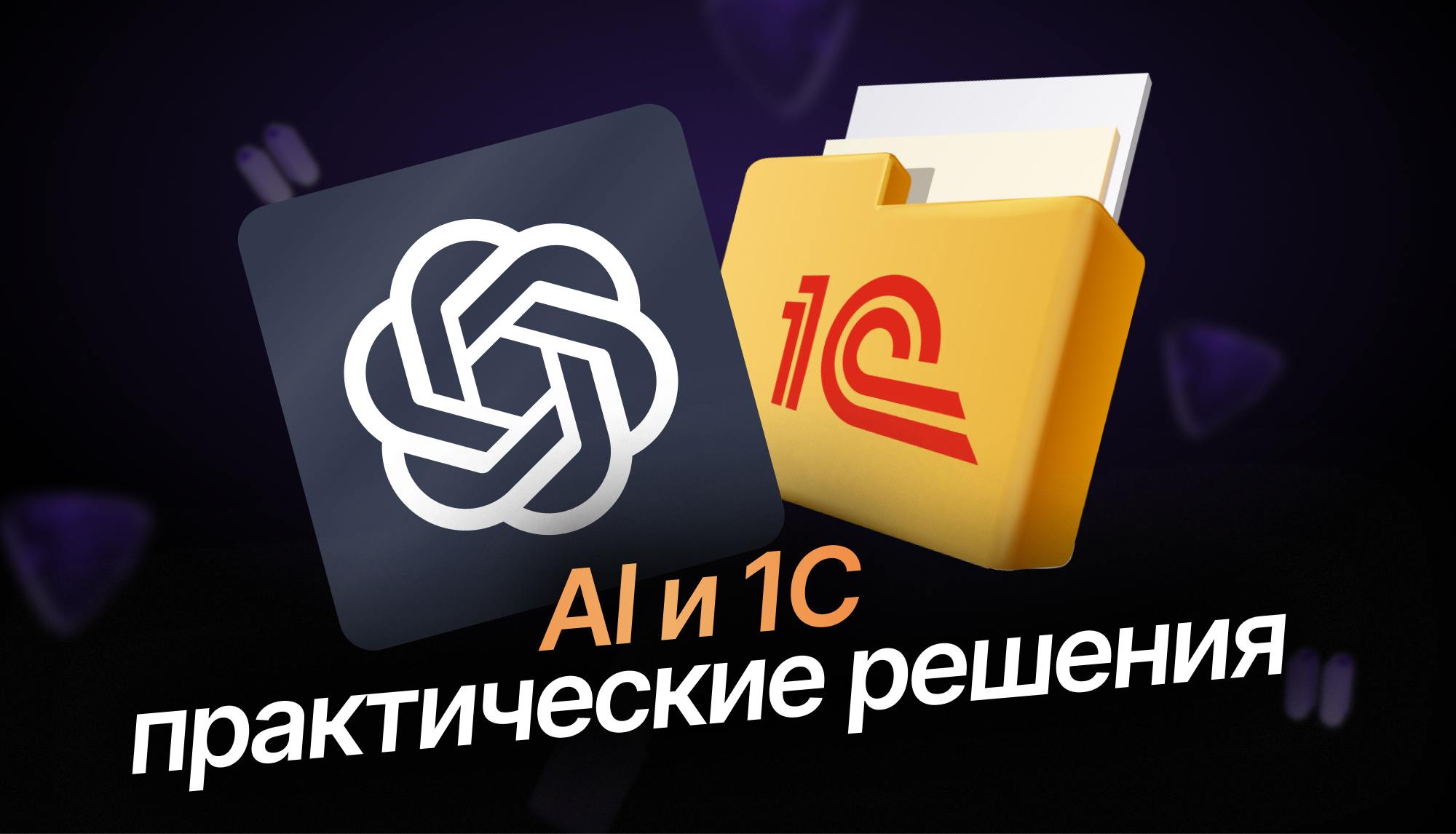1C+ AI: proven integration methods for business

Artificial intelligence (AI) is a real tool that is already helping businesses work faster, more accurately and more efficiently. One of the most striking examples is ChatGPT, which is able to communicate in plain language, analyze large amounts of data and suggest optimal solutions.
Integrating AI into 1C systems is not about robots from the future, but about saving time here and now. Routine operations, reporting, request processing, searching for errors in documents — all this can be partially or fully automated. As a result, the amount of “manual” work for employees decreases, productivity increases and more time for strategic tasks.
Let's take a closer look at how artificial intelligence helps businesses save time and effort within 1C, what tasks it can solve, and why this is becoming a new standard for effective work.
Data analysis in 1C using artificial intelligence
The integration of ChatGPT or similar AI models into 1C opens up a new level of data processing. You no longer need to export tables to Excel, build formulas or write complex queries: just query in natural language and the system will generate an analytical report or suggest the necessary information.
What tasks can AI perform in 1C:
- Sales analysis by product category. ChatGPT can show which product groups are growing steadily and which are sagging by comparing data from different periods.
- Identification of procurement bottlenecks. Artificial intelligence can find items that regularly delay shipment or do not cover real demand and suggest what to do about them.
- Predictions based on past data. The system can tell you how many items to order next month, taking into account seasonality, demand dynamics and stock balances.
Thanks to the integration of AI into 1C, the user simply enters a query: for example, “Show me which products sold worse than others in May.” After that, he receives an answer in an understandable form: a table, a graph or a brief conclusion. All this without the participation of an analyst, without lengthy configuration of reports, and without copying data to other programs. This is a real time saver and a way to make analytics available even to those who don't work with formulas every day.
Smart generation of reports and documents
Instead of manually writing cover letters, explanations to reports, or template explanatory notes each time, you can do all this with the help of artificial intelligence faster, without errors and taking into account the context of a particular situation.
Here are a few examples of what exactly ChatGPT can generate in conjunction with 1C:
- Cover letters to invoices or deeds. The manager simply indicates the type of document and the client's name, at the same time, the AI itself substitutes the details, formulates a polite text and adds the necessary phrases like “Please read it” or “We are waiting for feedback”.
- Explanatory notes to the reports. AI provides an explanation for the excess of budget expenditures, taking into account the actual 1C figures, and describes this clearly for a manager or auditor.
- Justification for deviations in the budget. Instead of dry numbers, there is a logical rationale: for example, “Advertising overspending is due to the launch of a new campaign that was not included in the initial budget.”
Smart generation of reports and documents has significant advantages. This solution saves time, as it takes a few seconds to create one template email instead of 10-15 minutes. ChatGPT doesn't make typos, doesn't forget to enter data, doesn't confuse wording. Documents are generated in the same style regardless of who creates them — accountant, manager or secretary.
Auto answers for customers and employees — directly from 1C
The integration of ChatGPT into 1C allows you to create a chatbot that can independently process typical requests from both customers and employees. It uses data from the company's database and internal documentation, so it does not require special training or scripts.
The chatbot can process various requests from customers and employees. He can answer frequently asked questions from customers: “Where is my order?” , “When is payment?” , “When will the item be shipped?” etc. A chatbot can tell process employees: “How do I close the shift?” , “Where can I find the act?” etc.
The main advantages of using a chatbot are:
- It works 24/7. Even outside of business hours or on weekends, the customer or new employee will receive a response without delay.
- You don't need to teach. ChatGPT independently “reads” internal documentation (instructions, regulations, directories) and generates answers based on it.
- It reduces the burden on people. Accountants, sales managers and IT departments are exempt from standard recurring requests.
Using a chatbot means faster response, less routine communication and increasing overall efficiency within the company.
How much does it cost and how difficult it is
Many entrepreneurs still believe that the introduction of artificial intelligence into work processes is expensive, difficult and is only suitable for large companies. In fact, this is not entirely true. Modern ChatGPT-based solutions can be launched in stages, without major start-up costs.
The real scenario looks simple: the company defines one routine task, for example, answers to typical customer requests, connects the AI module to 1C, tests it, gets results — and only then decides whether to scale. And all of this can be done in a week.
It is important to understand that integrating ChatGPT into 1C cannot cost a fixed amount. Only the company decides and chooses what features it needs. The more features are connected, the higher the total cost of work. But another important thing is that even minimal automation significantly saves employees' time. This means that every month of using such solutions returns investments by reducing the workload on staff, increasing the speed of processing requests and reducing the number of errors.
To sum up, the cost of integrating artificial intelligence can be considered an investment that starts working for businesses from the first weeks.
AI is not a substitute for people, but an assistant to business
The fear that artificial intelligence will “take the job” is no longer relevant. ChatGPT is not a substitute for accountants, managers, or analysts—it relieves them of the routine, speeds up standard operations, helps them avoid mistakes and focus on what matters. It's like working with an assistant who is always there, working non-stop and never getting tired.
The speed of implementing such solutions gives businesses a competitive advantage. Those who automate processes first serve customers faster, make decisions instantly and spend less time on daily tasks. And while others are only thinking about how to connect AI, someone is already using its results.
Start:Duck helps businesses implement artificial intelligence in 1C step by step and without unnecessary complications. Specialists take on the technical part, adapt tools to specific business processes and launch solutions that give tangible results from the very first days of operation.

